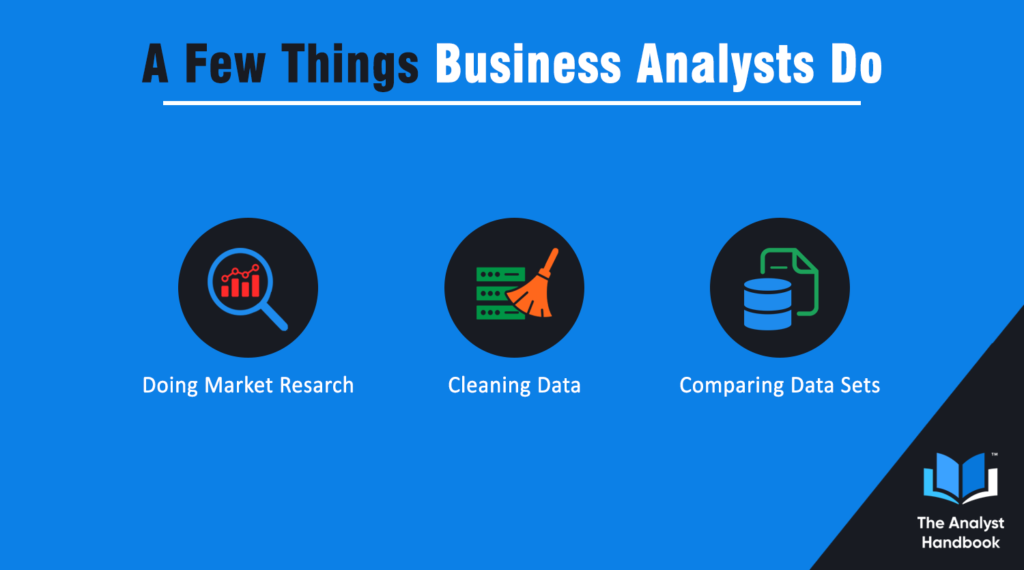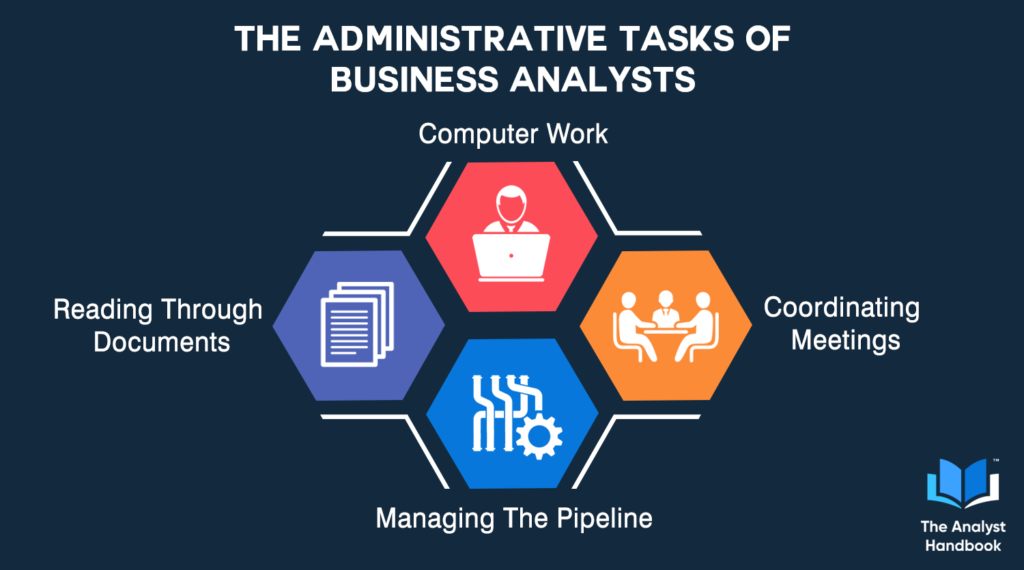What Does a Business Analyst Do?
First and foremost, what an Analyst does depends a lot upon the industry there in, the type of team they’re on, and the company they work for. The team, company, industry, and market all determine the type of work they do, the experience they get, and the knowledge they’ll gain.
Most Analysts do a combination or a variety of tasks regardless of the industry they’re in. It’s primarily an entry level position, that recent college graduates obtain, or newcomers to the industry receive. It’s the place where you start to get your first real world experience and start to understand what goes on in the industry, you’re in or the company your work for.
Analysts play a key role in business, finance, accounting, data, consulting, and many other industries. It’s an entry level position for most, and it teaches you the fundamentals of the industry, and you’re able to get firsthand, real world experience.
There are a variety of things an Analyst might find themselves doing, here are a few…
Helping Senior Level People
A lot of what Analysts or entry level positions are created for is to help the people above them. This often means completing the work they don’t want to, helping them complete various tasks, and being a professional resource for them. There’s a good chance you’re working for a boss or a team leader, who’s responsible for bringing in business or finding new ways to generate revenue.
Gather Packages of Information
There’s a good chance as an Analyst you’ll be tasked with putting together information packages in the form of memorandums (memo’s), presentations, or financial models. These packages are often an important part of any business and play a major role in the process of a company. Gathering all the important information and then putting it into a format that is easily digestible or readable is something a lot of Analysts find themselves doing. It’s an essential part of business, and one that is usually tasked to the entry level people.
Making the First Attempt
What we mean by this is there are often times where you’ll have to figure something out. Your boss will give you an objective or a task to complete, and there’s no preformatted way of doing things. It’s on to you try and figure something out. To put something together that meets the ask, and to satisfy the question you’re asked to answer. You’ll be the one who has to create something from scratch, or basically take the first attempt at trying to answer the question or task. Then, you’ll show or give the work to your boss, and they’ll advise you on next steps.

Doing Market Research
Whatever industry you’re in, or team you work for, they’re going to be competing in a marketplace. This means competing with other firms for similar business, finding new angles to pursue in the marketplace, or gaining a better understanding of the supply and demand forces currently in the market. A lot of this will come from research and taking a deep dive into the market. Odds are your superiors are going to have a feel or a pulse on the market, but the smaller nuances or developments might be up for you to figure out or find. A good majority of this will mean internet research or analyzing various reports or metrics.
Compare Data Sets
Depending on the industry and the company will determine what kinds of data you’re working with. This could be financial numbers, production numbers, or other data. As the Analyst, you might be tasked to find information or data that either confirms or validates the information at hand. This might mean going to find a competitor financial statements or seeing how another product performed in the marketplace. Depending on the company, the position, and team, will determine the different types of data you work with.
Cleaning Data
In certain companies or industries it might be common to receive data or information in a difficult format. This might mean in the form of a scan, or a broken document, and as an Analyst you have to clean it up. What this means, is to put the information into a computer format, or into a document that others can use. There’s still a large part of the business world that has yet to fully integrate computers and IT systems into their operations. If this happens with a client or a potential customer, odds are the Analyst is the one who has to clean the information up and put it into the right format for the firm to use or to analyze.
Find Potential Risks and Mitigants
Every deal, project, or transaction is going to have some level of risk involved with it. This could mean political risk, financial risk, market risk, or any other type of risk. As an Analyst, it might fall upon you to try and identify some of these risks involved. A lot of the time you’ll be asked to try and think of different possible solutions to these problems, or ideas to mitigate them. This way, there’s a solution that’s already been thought of or considered before moving further.
Creating Figures, Charts, and Tables
A lot of senior level people like to view data or research visually. This means the Analyst is tasked with creating different tables, figures, and charts to display the information they’ve found, or the calculations they’ve made. Depending on the type of data you’re working with, this could mean a chart, a table, or a diagram.
Work on Financial Models or Spreadsheets
The industry you’re in will determine the types of financial models or spreadsheets you work on. Every company and every industry deal in some capacity with spreadsheets or financial models. The types of numbers, data, or calculations Analysts make depends on the team their on, and the industry they’re in. Some Analysts find themselves calculating investment returns, some find themselves organizing charts of accounts information, some find themselves projecting rents for Real Estate, some find themselves putting together balance sheets and income statements, it all depends on the task, and the industry you’re in. Business these days has evolved and is centered around various financial spreadsheets, models, or calculations. It’s evolved to become a norm, and something most Analysts find themselves doing on behalf of their bosses, or on behalf of the projects they’re working on.

Computer Work
There are some senior level people or higher ups who aren’t as well versed with the computer or technology as some of the younger people, and most likely Analysts. The education system when they were in school had no knowledge on computers, and they’ve had to learn on the fly. This could mean helping them with formatting, helping them with data input, or showing them how to perform various tasks.
Reading Through Documents
A lot of times you’ll receive a group of documents with several pages to work through. You’ll get sent a lot of information and have to digest it. This means going through each document, each page and finding the important information, and filtering out the irrelevant information. There’s a good chance that a lot of it isn’t important, and can be disregarded, but the other information is going to be important. Needed and essential for the project. That’s the information you’ll have to find and dig through. That information is what your superiors are looking for and will be used.
Random Administrative Tasks
If your superiors don’t have secretaries or people to help them be organized, it might become part of your responsibility as an Analyst. Whether this means running errands for them, organizing their file cabinets, or straightening up their desk. There’s a possibility that it might become your responsibility as the low-ranking member. Unfortunately, there’s a chance this becomes part of the job, and is on you to help them with random administrative tasks per their requests.
Coordinating Meetings
Most industries have various meetings or gatherings of people to discuss important or essential matters. Finding the different meeting places, putting the right people on a meeting or email invitation, are all things you might find an Analyst doing. It’s important that everyone has the right dial in or call information, the right time and date of a meeting for everyone to be at the right place, at the right time.
Monitoring the Macro & Micro Events
There’s a good chance your boss will be in the loop and will have a good pulse of what’s going on in the industry and in the macroeconomy. Just in case, you also want to be well versed, and up to date on what’s going on in the industry you’re in. This means any big transactions, trades, or political news that might have an impact on the projects or tasks you’re working on. You don’t want to be caught off guard or make a mistake because someone missed a news story or event that was readily available. The macro and micro economy are always changing and evolving, and it’s important to know what’s going on in both of them.
Managing the Pipeline
Whether it’s upcoming deals or potential prospects, it’s important to keep a close eye on the deals or people that your boss is trying to generate future business from. Any leads or deals that your boss has told you to work on, or to keep an eye is something you want to make note of. Deals and projects come and go at different times, but you want to keep track of everything you’ve worked on in the past, in the future, and anything that might help or create business in the future. There’s a good chance the director or boss of the division is going to be busy and occupied most of the time. Keeping track of all the deals or leads you’ve worked on, or plan to work on, whether you’ve closed them or not, could be something that really helps your boss, and generates business for them. Sometimes organization is all it takes to make a deal or project happen.
Conclusion
Analysts handle a variety of tasks depending on their company, their team, and the industry their in. Their main objective is to help and support their bosses or superiors in order to win or generate more business for the company. Nowadays, there are a lot of tasks that need to be completed, or questions that need to be answered to make a deal happen or for businesses to occur. The leg work is primarily given to Analysts, as the low man on the totem pole. They are the ones who have to get the ball rolling on all the documentation, programing, researching, gathering, and coordination between companies.
The responsibilities of an Analyst vary from day to day, but remain similar in nature…
- Helping Senior Level People
- Computer Work
- Doing Market Research
- Gather Packages of Information
- Cleaning Data
- Comparing Data Sets
- Random Administrative Tasks
- Find Potential Risks and Mitigants
- Reading Through Documents
- Creating Figures, Charts, and Tables
- Coordinating Meetings
- Making The First Attempt
- Monitoring the Macro and Micro Events
- Managing The Pipeline
- Work on Financial Models or Spreadsheets
These are some of the responsibilities or tasks that Analysts will do on a daily basis. Each day and task depend on what’s needed to keep the ball rolling, or in order to get the ball rolling. There isn’t a one fits all, or a formula that Analysts follow. Whatever comes up or needs to get done, will fall into the lap of the Analyst. They’ll be the one responsible for creating the documents, inputting all the data, and making the calculations. A lot of what your superiors will do, is to check your work, inspect it, make tiny corrections or catch mistakes, and get the work up to a higher level. Using their experience and expertise, that Analysts don’t have, they’ll be able to upgrade and enhance the work to a level that’s presentable or reliable to use. The teamwork between the Analyst who does the legwork, and the boss who has the experience and expertise, is the type of relationship you can expect to have and develop as an Analyst.










